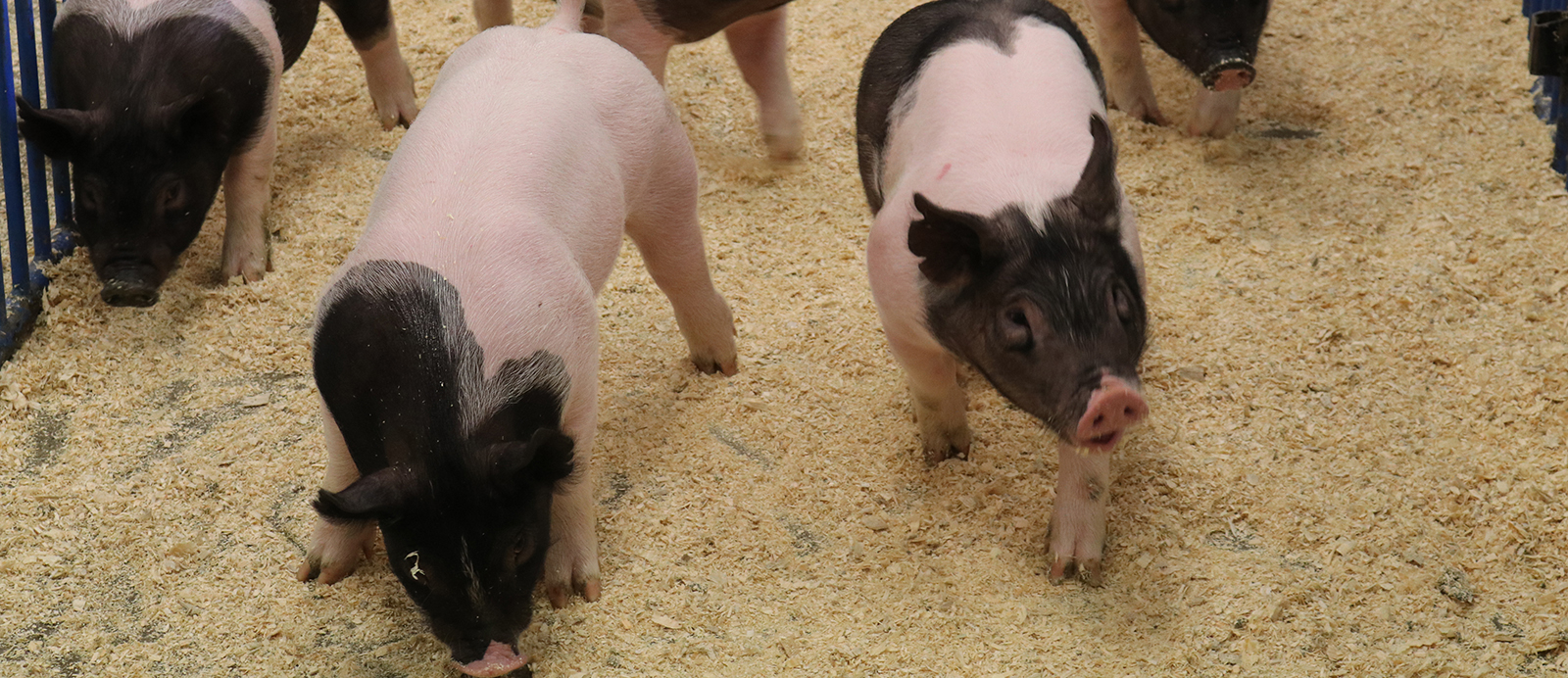An animal science minor provides an overview of critical areas of animal science and management applicable to other career paths. The minor increases your knowledge and marketability in areas of animal science. The minor allows you to take some general animal science classes and then choose if you want to specialize in a specific species or discipline.
This minor will be open to any UNL undergraduates who are not Animal Science majors. Obtain your minor by completing 18 or 12 hours of animal science courses.
What You'll Learn
The courses in the Animal Science Minor will develop the following skills:
- Apply handling and management skills related to animals.
- Develop animal nutrition, growth, reproduction, behavior, and/or management recommendations.
- Develop an understanding of animal physiology and biology.
- Develop skills to work with animals in a production or management setting.
- Propose solutions to problems in animal science fields.
18 or 12
Credit Hour Minor
15 - 20
Students Graduate Per Year
What Courses Will You Take?
Students must complete a minimum of 12 to 18 hours of Animal Science Courses. A minimum of 5-7 hours should be at the 300-level or above for the 18-hour minor and all 12 hours must be at the 300-level or above for the 12-hour minor.
*NOTE: Some courses have prerequisites that may not be included in the minor. Students should work with the instructor to determine if they are prepared to take courses without the prerequisites or if they need to choose a different course option.
Animal Science Minor (18 credits)
Course Descriptions
Required Courses (Credit hours):
ASCI 240: Anatomy and Physiology of Domestic Animals (4)
Fundamentals of the anatomy and physiology of domestic animals.(Select One) ASCI 100 Fundamentals of Animal Biology and Industry (3) -OR- ASCI 151: Introductory Companion Animal Biology (3)
(100) Overview of the industries in animal science; fundamentals of animal biology related to their application in those industries; and trends and current issues related to production and consumption of animal products important for human welfare.
-OR-
(151) Domestication, anatomy, care, nutrition, reproduction and welfare of dogs, cats, rabbits, and other companion animals.
(Select One) ASCI 250: Animal Management (3) -OR- ASCI 251: Introduction to Companion Animals (3) -OR- ASCI 252: Introduction to the Horse Industry and Management (3) -OR- ASCI 254: Basic Swine Science * (2)
(250) Principles of managing animals in typical production systems. Basics of managing beef, dairy, poultry, sheep, and swine through the life cycle for economic and efficient production.
-OR-
(251) Overview of pets, their care, nutrition, reproduction behavior, and health issues; exploration of other ways in which these animals can be used (e.g., in therapy, teaching).
-OR-
(252) Provides an introduction to the equine industry including history and basic biology of the horse, proper care and acceptable management procedures, and current issues. An overview of basic equine anatomy and physiology will be discussed as it relates to managerial principles associated with proper hoof care, disease prevention, breeding and genetics, nutritional management, reproduction, and animal welfare.
-OR-
(254*) Basic disciplines and concepts involved in swine production including: industry structure, trends and statistics; production phases and building; genetic improvement; reproduction; nutrition; health and bio-security; nutrient management; marketing and meat quality; and career opportunities in the swine industry.
* This course is taught by Iowa State University as part of the GPIDEA/Ag*IDEA course offerings, Registration with permission from your adviser and CASNR Online Education Office.
(Select One) ASCI 200: Animal and Carcass Evaluation (3) -OR-ASCI 210: Animal Products (3) -OR- ASCI 213/NUTR 213: Meat Specifications and Procurement (3) -OR- ASCI260: Basic Equitation (2) -OR- ASCI 271: Companion Animal and Equine Behavior (3)
(200) Comparative evaluation of animals and their carcasses and products. Basic animal growth and development and characteristics of beef, pork, lamb, and goat used to determine carcass value. Federal and industry product standards. Introduction to the usage and interpretation of USDA market reports used to determine market value of animals and their products.
-OR-
(210) Knowledge of edible animal products with particular emphasis to meat products from livestock and poultry. Includes all aspects of the meat industry from slaughter to consumption. Methods of slaughter and fabrication, conversion of muscle to meat, processing techniques, preservation and storage, and consumer related topics discussed and demonstrated.
-OR-
(213) Selecting and purchasing meat for the hotel, restaurant, institutional industry, and the retail markets.
*For those students who have an interest in a career in Culinary Science, Meat Science, and/or Dietetics.
-OR-
(260) Study and application of basic equitation principles for the novice rider. Review of fundamental horse safety and horsemanship to include handling, grooming, equipping, riding western or English, and the relationship of riding to physical and mental well-being. Development of balanced seat, hands and posture at all the natural gaits of the horse. Emphasis will be on control of the horse through the use of the primary and secondary aids. Welfare and communication considerations in order to have effective horse-human relationships.
-OR-
(271) Companion animal and equine behavior. Application of behavior principles to describe normal and problem behaviors of common companion animals and horses.
Choose 5-7 hours of andy ASCI 300/400 level courses (ASCI 399 and ASCI 496 are excluded)
- Two hours from ASCI experiential learning courses may be used. Examples of courses include:
ASCI 310: Fresh Meats (3)
Fresh meat from beef, pork, lamb, and poultry. Characteristics of muscle, meat technology, preservation, merchandising concepts, and markets.
ASCI 321: Companion Animal Nutrition (3)
Digestive anatomy and physiology of companion animals including dogs, cats, small mammals, and exotic species. Unique nutrient requirements, pet food formulation, and regulations.
ASCI 322: Equine Nutrition (2)
Equine nutrition including digestive anatomy and physiology. Nutritional requirements of horses as related to growth, reproduction, and performance. The relationship of nutrition to disease and environment. Management practices and application of current equine nutritional research.
ASCI 342: Equine Reproduction (2)
Anatomy and physiology of stallion and mare reproductive systems. Estrous detection systems, artificial and natural breeding techniques, infertility, semen collection and processing, reproductive management, and record keeping.
ASCI 354A: Swine Breeding & Gestation (1)
Concepts related to: reproductive physiology and endocrinology of boars and sows; genetic selection programs; development programs for future replacement gilts and boars; semen collection, evaluation, and preparation; detection of estrus and artificial insemination; pregnancy diagnosis; feeding and house programs for gestating sows; environmental management; records; diseases; and development of quality assurance programs for identifying and solving reproductive problems.
* This course is taught by North Carolina State University and is part of the GPIDEA/AgIDEA courses offerings. Registration with permission from your advisor and CASNR Online Education.
ASCI 354B: Swine Farrowing Management (1)
Advanced integration and application of reproductive management concepts during farrowing and lactation. Identification of production trends; formulation of strategies to improve productivity; and parturition and neonatal management.
* This course is taught by the University of Missouri and is part of the GPIDEA/AgIDEA course offerings. Registration with permission from your advisor and CASNR Online Education Office.
ASCI 354D: Swine Nursey Management (1)
Overview of the critical management, housing, and financial considerations relevant to the successful operation of a swine nursery, grow-finish, or wean to finish enterprise, including: nutrient requirements; building and facility management; and marketing.
* This course is taught by Penn State as part of the GPIDEA/Ag*IDEA course offerings, Registration with permission from your adviser and CASNR Online Education Office.
ASCI 354E: Employee Management for Swine Industry (1)
Effective employee management in swine production units. Assist students in understanding the principles, policies, and practices related to procurement, development, maintenance, and utilization of employees.
* This course is taught by an institutional member of the GPIDEA/AgIDEA consortium. Registration is with permission from your advisor and CASNR Online Education Office.
ASCI 354F: Swine Environemnt Management (1)
Response of swine to thermal environment, ventilation system design and analysis, heating and cooling systems and examples of various designs for all phases of production. Trouble shooting ventilation systems and energy analysis of production units.
* This course is taught by Iowa State University as part of the GPIDEA/Ag*IDEA course offerings, Registration with permission from your adviser and CASNR Online Education Office.
ASCI 370: Animal Welfare (3)
In-depth exploration of the issues involved in animal use. The historical, biological, ethical, and social aspects of human/animal interactions in Western culture.
ASCI 422: Advanced Feeding and Feed Formulation (3)
Feeding practices for domestic animals. Applied animal nutrition and feed formulation.
Animal Science Minor (12 credits)
Twelve (12) credits of ASCI courses above 300 level—excluding ASCI 399 Independent Study in Animal Science and ASCI 496 Independent Study in Animal Science.
Undergraduate Catalog Listing
Meet Your Animal Science Minor Advisor
Dr. Bryan Reiling, is a Professor of Animal Science and a Livestock Management Extension Specialist at the University of Nebraska-Lincoln. Dr. Reiling teaches five courses, including Fundamentals of Animal Biology and Industry (ASCI 100), Animal Production Skills (ASCI 150), Animal and Carcass Evaluation (ASCI 200), Animal Management (ASCI 250), and Principles of Meat Animal Evaluation (ASCI 300D).
Contact Dr. ReilingHow to declare the minor?
Students would work with their academic advisor or their college's advising center to declare the Animal Science (18 or 12 credits) Minor.
